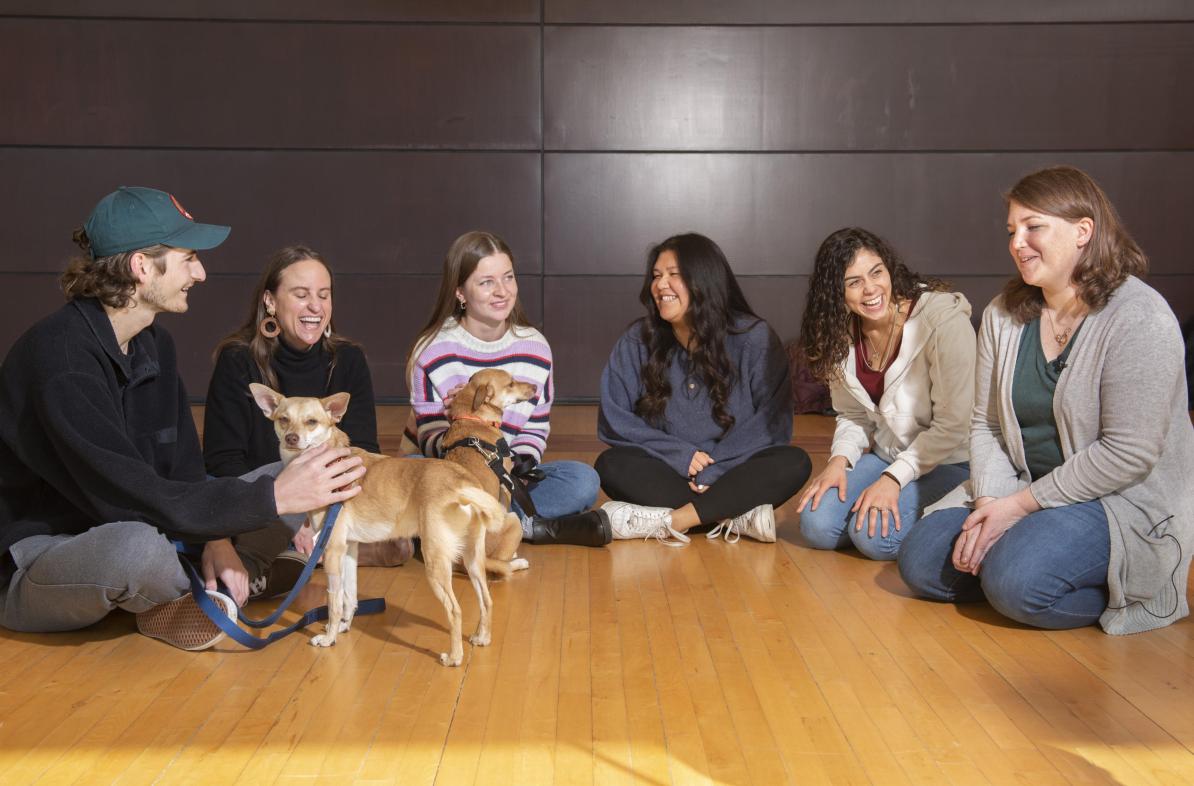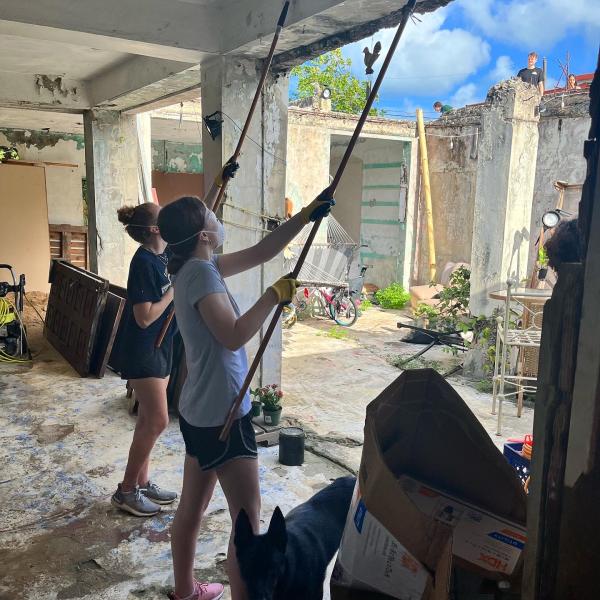
Blugolds return from immersion with rescue dogs, new understanding of Latin American culture
When University of Wisconsin-Eau Claire students return from their immersion trips they bring all sorts of things home with them, be it a new appreciation for other cultures or keepsakes made by local artisans.
You can now add stray dogs to the list, thanks to Blugolds Maddie Eggert and Eddie Flottemesch.
“There was no way we could leave them behind,” Flottemesch says of the year-old canine brothers — now named Reggie and Jack — who flew home with them after their Winterim service immersion in Puerto Rico. Eggert agrees, saying that “this was a service trip, so we had to bring them with us.”
Flottemesch and Eggert were among the 12 students and two faculty and staff members who spent 10 days in Puerto Rico completing a series of daylong service projects. When they arrived at their volunteer campsite, they found two stray dogs there. Initially aggressive, the dogs quickly befriended the group.
“They came to trust us and would sleep outside our residence building and even visit us during morning yoga sessions,” says Dr. Cheryl Jiménez Frei, an assistant professor of history who co-led the program. “They became our little mascots. The thought of leaving them was painful to everyone in the group, so we worked with Paradise Rescue, a shelter we had volunteered with in Puerto Rico, to get them prepped to be brought to the Midwest for foster.”
Flottemesch and Eggert flew home with Reggie and Jack, and Katy Rand, the coordinator of student leadership and Greek life who co-led the trip, is fostering them until they find their forever homes.
Paradise Rescue has an “angel program” that asks people to fly with dogs to the continental U.S., where they have a better chance of being adopted. They have partner shelters in Minneapolis and Wisconsin, so the director asked if any Blugolds would fly back with a dog. Several students said yes, as did Jiménez Frei.
“We said of course; we were there to do service and do good,” says Jiménez Frei, who flew back with Eugene, an abandoned senior dog who is now in his forever home with a volunteer from Tails of Hope Animal Rescue in Alma.
Another Blugold, Nevaeh DeKeyser, flew back with Naomi, a 14-week-old puppy. She says she cried happy tears when she learned the dog was adopted within days of arriving in Minneapolis.
“I’ve never even had a dog, but I had to do it,” DeKeyser says of flying with the pup. “Knowing that I helped give her a fresh start — that I was part of helping her go to a better home and having a better life — is really inspirational.”
Once they knew about the “angel program,” they asked if Reggie and Jack could join so they could bring them to Eau Claire. The director said yes, but they had to pay for the flight and other costs associated with the two dogs. So, Rand and Jiménez Frei launched a Go-Fund-Me page to raise the money.
“The response was so heartwarming; lots of faculty, staff and students donated, so it truly was a group effort to bring these adorable little guys back here to hopefully find a forever home,” Jiménez Frei says.
“It was so cool to see the outpouring of people who wanted to support the dogs,” says DeKeyser, a sophomore nursing major from Green Bay. “Just the first day, we raised close to $500. What we were doing really connected with the campus community, so people wanted to help.”
Embracing every opportunity
While the dogs were an unexpected highlight of the immersion, bringing them home was just one of many incredible experiences the students had as part of the university’s first immersion in Puerto Rico.
Having a domestic intercultural immersion experience in Puerto Rico helps students see what life is like in a U.S. territory — as opposed to a U.S. state — and the legacy of colonialism that has led to challenges on the island, says Dr. Jeff DeGrave, UW-Eau Claire's intercultural immersions coordinator.
“It also helps remind us that Latin America is not a place that’s ‘over the border,’” DeGrave says. “Without question, Latin America is as much a part of the U.S. as is the U.S. a part of Latin America. There are no geographic boundaries between cultures. This program served as an excellent reminder of the arbitrary nature of the lines that are drawn to separate people from one another.”
Rand and a former co-worker proposed the program so students could have a service-focused immersion during Winterim. Their goal, Rand says, was to keep the immersion domestic but to include more cultural elements. Puerto Rico fit their vision perfectly, she says.

In Puerto Rico, the Blugolds volunteered at project sites, mostly around the small community of Luquillo. Projects included activities like maintaining trails in El Yunque National Forest, the only rainforest in the U.S. Forest Service system; volunteering at a dog shelter; trimming mangroves; cleaning up beaches with an eco-tourism nonprofit; repainting a school; and assisting a local family with home repair, landscaping and cleanup projects, including some that remained from Hurricane Maria.
Calling the immersion an “incredible, awesome experience,” Flottemesch, a native of Neenah, says he was surprised that “a crew of just 14 people could make such a difference for a community. That’s something I won’t forget.”
“Coming from a place where we have a lot, it feels good to give back,” says Flottemesch, who will graduate in May with a management-entrepreneur major, a marketing minor and a leadership studies certificate. “The people there are really focused on the community aspects of their lives, which was a beautiful thing to see.”
Students say a highlight was helping a family repair their home, which was damaged by Hurricane Maria. They helped with several projects, such as painting walls and carrying sand to the roof to stop leaks.
“The family didn’t have a lot to work with, but they still did so much for the people around them,” says Noucee Thao, a Kimberly native who will graduate in December with a psychology liberal arts major and family studies minor. “They put their heart and soul into looking out for others, so it was really cool to do something for them.”
The service projects helped students easily connect with local people, who all were “super welcoming,” Thao says. This was her first time traveling outside the continental U.S., and the experience will make her more confident as she interacts with people from other places and cultures in the future, she says.
The immersion also made her realize “how capable we are as human beings,” Thao says. “My biggest takeaway is to just help people be more, be kinder and just offer what you can.”
For Eggert, whose plans to study abroad were canceled because of COVID-19, the immersion gave her an opportunity to experience a different culture before she graduates in May with a sociology liberal arts major, family studies minor and American sign language certificate.
Puerto Rico is “a beautiful place with a beautiful culture,” says Eggert, of Hastings, Minnesota. She admires how people there work together as a community to better everyone’s lives. She also was amazed by how quickly the UW-Eau Claire students and mentors bonded during the trip.
“One of the things I took away from this was the value of teamwork,” Eggert says. “We worked together so well. It was amazing to see the progress we made from the beginning of the trip to the end.”
Eggert, who wants to be a high school counselor, says seeing the good that can come from doing even small tasks for others will help her in her future career. “It doesn’t have to be something big like building a house,” she says. “It’s just being there for someone; just showing up for them.”
DeKeyser — who had never flown on a plane before traveling to Puerto Rico in January — says the immersion was a “life-changing” experience that took her far outside her comfort zone.
“I felt like coming to Eau Claire was a big step for me, so to now have the opportunity to go out and be part of all of this was really mind-blowing,” DeKeyser says.
Students were the highlight
Rand and Jiménez Frei say the highlight of the immersion was sharing the experience with the students.
“They were so curious and kind and engaged in the experience,” Rand says. “They were so thoughtful and asked so many questions. It was really cool to see them connect with this other culture that they didn’t know much about before going.”
The students developed “really cool, authentic relationships” with each other and with community members as they learned about the struggles Puerto Ricans face, as well as the things they value.
Jiménez Frei agrees, saying volunteering alongside the students was “wonderful and enlightening.”
“They were beyond impressive in their kindness, dedication, curiosity, positivity and resilience,” Jiménez Frei says. “It was clear the program, and all the people they encountered, helped the students each grow and push themselves in so many ways.
“Seeing them genuinely connect with the communities and individuals we worked with, and better understand the links — both historical and contemporary — between the U.S. and Latin America, was fantastic. I’m not exaggerating when I say it was the most rewarding thing I’ve done thus far in my academic career.”
While Jiménez Frei has traveled extensively in South America, she never had been to Puerto Rico.
“I wanted to go there for my own growth but seeing it through the students’ eyes — seeing them responding to things and growing and learning and reflecting — was the best thing,” Jiménez Frei says.
You may also like


